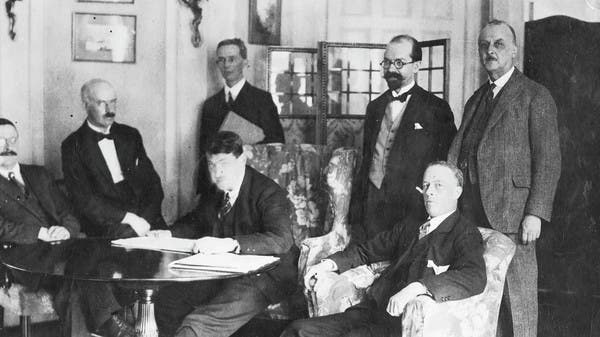The sixth of December 1921 was a historic day in Ireland. On that day, representatives of the British government and the Irish authorities signed the Irish English Agreement, commonly known as the London Agreement, in which Britain recognised the free Irish state following years of gruesome fighting.
Under this treaty, the southern Irish allowed the establishment of their country in exchange for their pledge to the British crown and granted Northern Ireland to the British.
Many Irish nationalists applauded it, but many also opposed it and saw it as a complete capitulation.
After centuries of the occupation, the Irish took advantage of the authorities’ preoccupation with the First World War to announce the beginning of their rebellion against London in 1916, coinciding with Easter.
Despite the collapse of this revolution, the Irish tended to carry on their uprising in response to Irish nationalist Michael Collins’ guerilla campaign, which pushed the British to leave Ireland.
British leaders worried the economic effects of this war on Britain, which was recently worn out from the ravages of World War I, after years of terrible combat and political strife.
London also took note of the growing public support for Irish independence at the same time as a huge Irish contingent lined up behind Michael Collins.
In light of this, British Prime Minister David LLOYD George wrote to Irish President Iremon de Valera and requested that he declare a cease-fire so that negotiations to end the Irish crisis could begin. In addition, the Irish President sent Michael Collins and Arthur Grifith to discuss the terms of a peace treaty with the British.
David Lloyd George put pressure on the Irish envoys by threatening to restart the war and dispatch a strong contingent of British soldiers to Irish territory in response to their growing demands. Collins and Griffiths were adhering to the terms of the London Treaty, which was formally signed on December 6, 1921, in the face of these dangers.
Under this treaty, the British government agreed to establish a free Irish state that will enjoy Dominion and pledged to withdraw its forces from Irish lands.
On the other hand, the free Irish state agreed to provide loyalty to the British crown and provide a part of compensation to the British for the losses of the First World War, and it also accepted the same with the survival of Northern Ireland under the authority of London.
The London Agreement of 1921 caused opposition and supporters to split apart in Ireland.
The subsequent period saw the effects of a civil war in Ireland that took place between 1922 and 1924 and claimed thousands of lives. During August 1922, Irish nationalist nationalist Michael Collins was assassinated by one of the opponents of the London agreement after accusing him of betrayal and disguise of the Irish case..
The Irish independence from the British was made possible by this pact.

